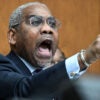It could be “one strike and you’re out” for Airbnb users in Chicago.
In a series of new rules, Chicago officials recently outlined a plan to regulate the short-term rental market. Though city officials say the rules are meant to make it easier for people to rent out their homes using services like Airbnb, the fine print reveals something far more sinister.
Step out of line, even once, and you could end up in jail for up to six months.
“The fines are $1,500 to $3,000 per offense and/or subject to up to six months of incarceration, with each day that a violation exists treated as a separate and distinct offense,” city Alderman Joe Moore said in a statement announcing the proposed rules.
In other words, if the city decides that you rented your apartment for a weekend without the proper permission slips, you could go to jail for an entire year.
That’s got some Airbnb users a little worried.
Valerie Landis has lived in Chicago for 12 years and has been renting her current condo on Airbnb since June, but the “hefty fines and penalties” in the new regulations are concerning.
“I am a law-abiding citizen and follow the rules I know about,” Landis said. “However, the city can do what they want, so it doesn’t mean I’m not scared I will get a fine.”
Under the proposal, hosts will be required to register their units with the city through what city officials are calling a “free and simple online process.” House-sharing companies will also be able to register these units directly with the city.
“The proposed ordinance will make it easier for hosts who periodically rent out their living space either on their own or through services, such as Airbnb and VRBO,” Moore said. “The new proposal will support the growing industry while ensuring the city is able to track units made available for lodging and respond to complaints.”
Moore and Chicago Mayor Rahm Emanuel stressed that the registration process is “simple,” but it is a bit more complex than they claim.
Getting the license requires submitting contact information, proof of insurance, a written plan for complying with the regulations, and “any other information that the commissioner may reasonably require in connection with issuance or renewal of the license.”
The licensee is then responsible for “all applicable federal, state and local laws and regulations regarding collection and payment of taxes, including hotel accommodation taxes” and for any criminal activity “of the guests, or of the invitees of the guests.”
And, again, one mistake in dealing with all that could land the licensee in jail—for six months.
Landis believes that the city is making a mistake by trying to regulate all Airbnb users the same way.
There’s a clear difference between people like Landis—she has nearly perfect reviews on Airbnb and has been identified as a “Superhost” by the site—and others who might be abusing the system.
“I care why people are renting my space. I don’t want my house trashed,” she said. “That is different than the average Joe renting 5-6 units to make a profit and not caring about the community or what it is doing to the neighborhood.”
Landis isn’t sure if the new regulations will limit her ability to rent her space, but they certainly could.
She has used Airbnb to help pay her mortgage and to make extra income while she travels for work. She’s made more than $1,500 a month renting out her extra space, often for about $150 per night.
But under the new rules, residents of the city will be limited in how often they can list their rentals. Renting the same space for more than 90 nights per year will require an additional “bed and breakfast license” from the city.
The B&B licensing angle is one that other cities are taking, too. But that’s like fitting a square peg into a round hole—some Airbnb guests won’t be sleeping in beds (you can stay in Chicago for $12 a night if you’re happy to sleep on this guy’s futon) and have no expectation of receiving breakfast.
It also sets up a much higher regulatory burden for would-be renters. The license costs $250 up front and requires that homeowners open themselves up to city inspections on a regular basis.
The new regulations will generate considerable revenue for the city. Moore says the licensing scheme will generate $1 million annually, which he wants to use to “support affordable housing and reduce homelessness.”
Noble goals, to be sure. But does the city understand exactly what it is doing?
Landis isn’t so sure.
“I don’t think city officials see the good side of Airbnb,” she said. “I think they immediately see the negative or one bad story. Airbnb has created a community.”






























